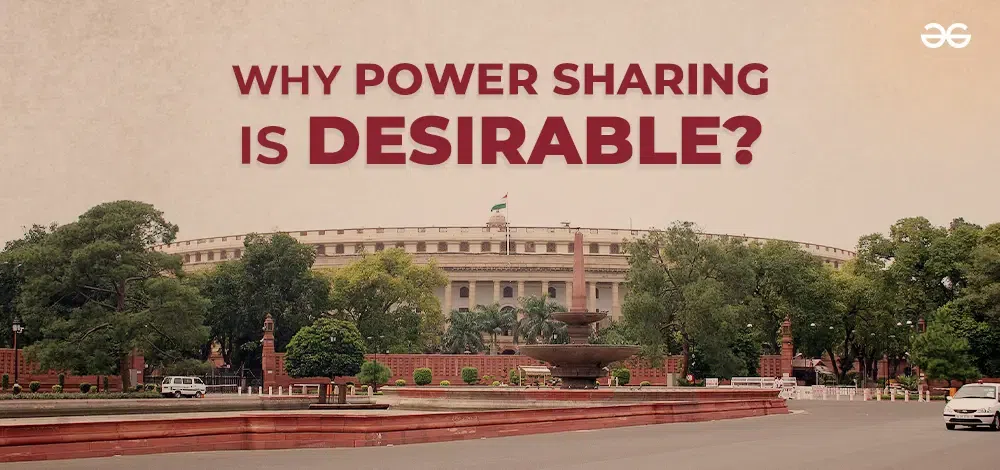Why Power Sharing is desirable?
Last Updated :
16 Aug, 2023
Power sharing is a conflict resolution practice in which multiple groups share political, military, or economic power with each other according to agreed rules. It can refer to any formal framework or informal treaty governing the distribution of power among divided communities. Since the end of the Cold War, power-sharing systems have become increasingly popular in negotiating the settlement of armed conflicts. Two common theoretical approaches to power-sharing are dissociation and centripetal theory.

Why Power Sharing is Desirable?
Dimensions of Power Sharing
Essentially, power-sharing agreements have provisions that involve at least one of the following: Political, economic, military, or territorial control. The sharing of political power includes the rules governing the distribution of political tasks and the exercise of decision-making power. Power can be shared by ensuring the simultaneous inclusion of all major parties in the governing cabinet through rules on forming a major coalition. Share through political equivalence, allowing minorities to remain competitive and gain some political power through democratic elections. Ratios also indicate the sharing of economic power, since the allocation of public resources can be set according to the size of communities. In neonatal systems, the political function can also be closely linked to economic opportunity, meaning that the equitable distribution of political power overlaps with economic power sharing.
Theories of Power Sharing
Power-sharing theories make empirical and normative claims about the usefulness or desirability of power-sharing systems for managing conflict in divided societies. Two prominent theories of power-sharing, which make competing claims, are associative and centripetal. Empirically, each theory prescribes different power-sharing systems, such as dissociative versus afferent alternative voting.
Forms of Power Sharing
It is assumed that all power of a government must lie with one person or group of people in one place. Otherwise, it will be difficult to make quick decisions and earn their respect. But these notions changed with the emergence of democracy. In a democracy, the people govern themselves through institutions of autonomous government. Everyone has a say in the formulation of public policies. Therefore, in a democratic country, political power should be distributed among the citizens.
In modern democracies, power sharing can take many forms, as shown below:
- Power is shared among different branches of government, such as agencies. This is called the horizontal distribution of power because it allows different branches of government at the same level to exercise different powers. Such separation ensures that neither body can use infinite power. Each organ controls the other organs. This arrangement is known as the check and balance system.
- Power can be shared between governments at different levels – a common government for the whole country and governments at the provincial or regional level.
Why is Power Sharing Desirable
- Power sharing is a good way to ensure the stability of the political order because social conflicts often lead to violence and political instability.
- Imposing the will of the majority community on others may seem an attractive option in the short term, but in the long run, it undermines national unity.
- The tyranny of the majority not only oppresses the few but also brings destruction to the majority.
- Citizens have the right to be consulted on how they should be managed.
- The democratic rule implies sharing power with those affected by its implementation and those who must live with its influence.
- A legitimate government is one in which citizens, through participation, acquire a stake in the system.
FAQs on Why Power Sharing is Desirable
Que 1. Write the types of power sharing.
Answer:
Sharing of power in different departments of government. The sharing of power among governments at different levels. The sharing of power among social groups. Power sharing among influential groups.
Que 2. What do you mean by vertical power-sharing?
Answer:
In this vertical division, local government will operate under union or state government and state government will operate under union government. Power is shared between levels of government.
Que 3. What does horizontal power sharing mean?
Answer:
The even distribution of power between different governing bodies is called horizontal power sharing. The horizontal division of power puts all government agencies, legislative, executive and judicial, at one level.
Like Article
Suggest improvement
Share your thoughts in the comments
Please Login to comment...